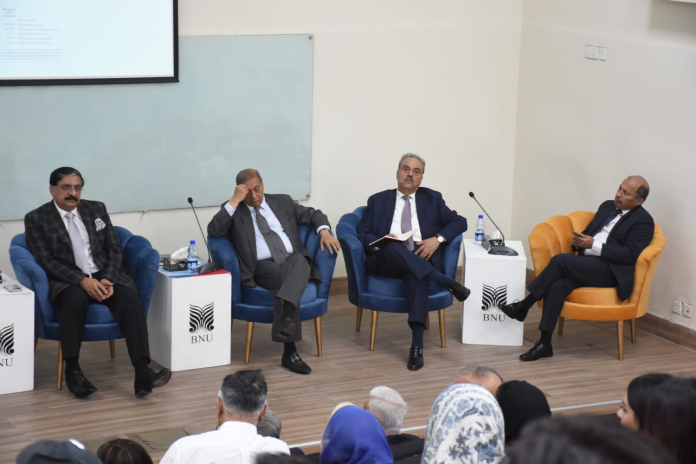LAHORE, OCT 31 (DNA):Speakers at a seminar suggested that Pakistan must make progress towards (China-Pakistan Economic Corridor) CPEC’s extension to Afghanistan as a priority.
The Beaconhouse National University (BNU), Lahore hosted the Seminar entitled “Regional Connectivity – BRI and CPEC Extension to Afghanistan and Beyond,” according to a BNU press release.
The purpose of the Seminar was to have threadbare discussions on the prospects as well as challenges to China’s mega-connectivity initiative BRI and its flagship project CPEC’s extension to Afghanistan and beyond for promoting regional connectivity and economic integration.
Faculties, researchers and students from four universities in Lahore were in the audience in this Seminar.
The Seminar was attended by eminent experts on the subject including Ambassador Asif Durrani who until recently was Pakistan’s Special Envoy on Afghanistan, Haroon Sharif, former Minister of Investment, Dr. Ishrat Hussian former Governor of the State Bank of Pakistan.,Mirwais Yasini former Deputy speaker of afghan Wolesi Jirga, Ambassador Javed Hussain former Pakistani diplomat having regional expertise and Lt. General Nasir Khan Janjua, former National Security Adviser. Prof Tang Jun of the Pakistan Studies Center at Inner Mongolia University China also delivered remarks online at the Seminar. Mansoor Ahmad Khan, former Ambassador of Pakistan to Afghanistan had convened this important Seminar in his capacity as Director of the Beaconhouse National University’s Center for Policy Research (BCPR).
The participants made thought provoking remarks regarding the opportunities that existed for building economic linkages through CPEC’s extension to Afghanistan and beyond to the central Asian countries and Eurasia as well as the impediments and challenges that continued to hinder the progress in achieving this goal.
All the distinguished speakers were unanimous in pointing out that promoting economic integration with neighbours and region was of crucial importance for Pakistan’s economic recovery, growth and development.
In this regard, they endorsed that CPEC as a hallmark of China’s BRI needed to be used as a key instrument for strengthening regional infrastructure, energy and trade/transit connectivity.
Their remarks also echoed a consensus that CPEC’s extension to Afghanistan had to be a starting point towards achieving this objective.
However, all the speakers were also cognizant of the number of challenges including the intensifying geo-political factors emanating from an increasing US-China global power struggle, Pakistan’s own political and economic fragility, nose-diving relations with Afghanistan and opposition to the BRI and CPEC by countries like India.
Some of the speakers also suggested the need for bold efforts by Pakistan to overcome these impediments and make progress towards CPEC’s extension to Afghanistan as a priority.
Ambassador Asif Durrani said that it was a wrong perception that CPEC was not making progress; over the last ten years CPEC has made phenomenal advances through substantive Chinese investments. “As to the extension of CPEC to Afghanistan, in his view several impediments need to be overcome. The biggest one is that the Taliban since taking over Afghanistan have not been to develop a normalized interaction with the world due to their unacceptable stance on some of the issues.”
He described that India also continue to see CPEC and its extension to Afghanistan as a threat to its own interests. Durrani emphasized that stability in Afghanistan and the region was important for promoting economic interaction including on CPEC extension.
Haroon Sharif underlined that connectivity not a goal per se. It should actually translate into economic benefits and prosperity for the people. In this regard he said that 40 percent of the connectivity projects in the world fail because of not accomoding this crucial factor. Haroon Sharif stressed that in a region where the market of Pakistan is the biggest excluding China and India and knowing that 60% of global growth is coming from China and India, “if we want to become a part of the global network, connectivity with India and China is necessary”.
Mirwais Yasini sharing an Afghan perspective suggest that security was of prime importance for economic endeavours. He acknowledged that for a land locked country like Afghanistan, CPEC would be pivotal in job creation and preventing anarchy in the region. He alluded that Afghanistan’s mineral resources such as lithium mines could be vital for production of batteries and so promoting industry and technology. He reiterated that extension of BRI and CPEC to Afghanistan will provide a competitive advantage to China over other international investors, but this can only happen if security was ensured.
Ambassador Javed Hussain and Dr. Ishrat Hussain in their respective remarks also elaborated that Chinese were quite sensitive to the security issues in view of the recent incidents causing several Chinese casualties. Dr. Ishrat Hussain observed that for achieving unhindered progress on the CPEC, the two countries needed to evolve a mutual security arrangement
General Nasir Janjua was also very candid in his remarks. He recognized several challenges to CPEc and BRI. One was global opposition by the US and the West to China. The other was regional where India wanted to counter both China and Pakistan. He opined that that balancing on a sea-saw, we could only make an effort to be at the or close to center and not sway too much on either side. And focus on putting the own house in order.
The speeches were followed by an engaging interactive session. The researchers and students were generally critical to the approach of the government in addressing challenges to CPEC and interaction with neighbouring countries. The key concerns expressed by students were a highly militarized nature of Pakistan’s policy making, continued ignorance of the leadership for political representation and inclusiveness of all segments including Baloch and other marginalized segments of population and inability towards opening borders for trade, transit and economic interaction in the region.
The participants appreciated the importance of such events to openly discuss the crucial areas of Pakistan’s policies relating to neighbours and regional economic interaction to increase awareness and bringing youth on board.

















